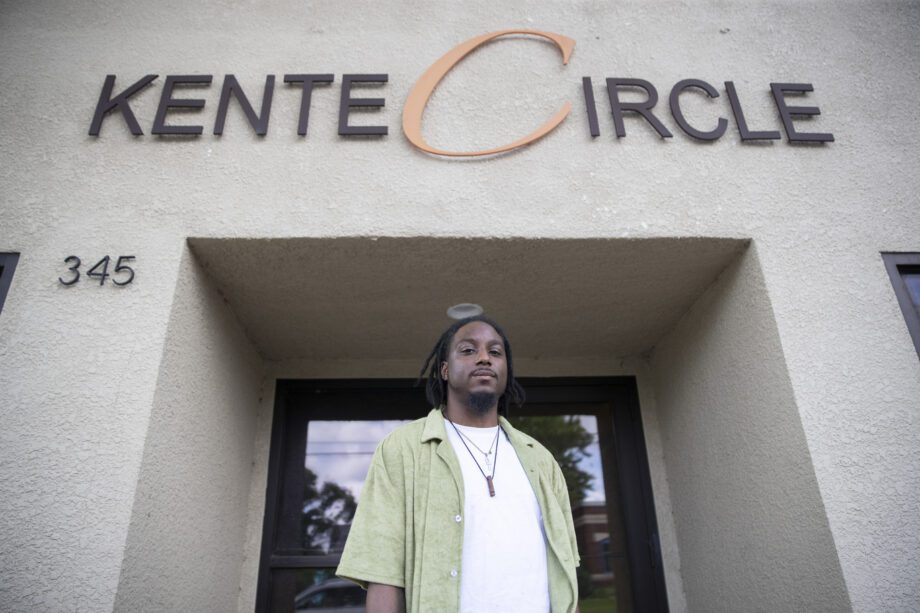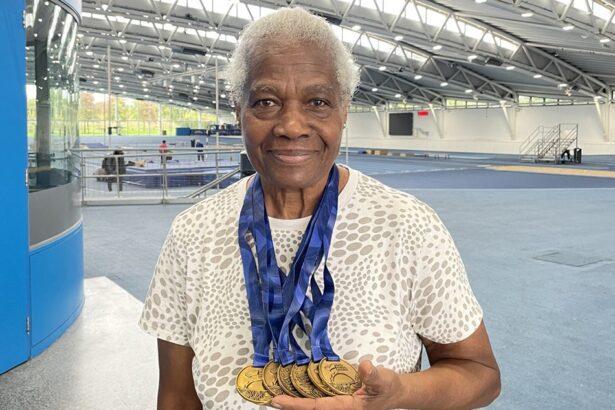LJ “Soul” Tucker has connected with a wide variety of people in his work as a therapist, yet much of the underlying issues his clients bring to him are universal issues faced by many.
Soul has been a licensed therapist at Kente Circle for the past five years. His clientele is roughly 85% Black people, ranging in age from teenagers to adults in their 50s. He’s thankful for the opportunity to work with such a diverse group of people not only for his professional development but also for the direct benefit it gives him in his own mental health journey.
Soul doesn’t see his role as a therapist who ” fixes” people; rather, he envisions himself being able to connect with community members and help guide them to their own solutions.
Many of the topics addressed in his sessions relate to identity and race-related issues, oftentimes with interracial couples. Soul specializes in Marriage and Family Therapy, so he sees his fair share of couples and their areas of concern.
“Some of the common themes that I’ve personally faced have been families who identify as white and have adopted African American children that don’t have the same identity,” he said.
– ADVERTISEMENT –
Soul has also worked with couples of different backgrounds through difficult conversations around race and systemic issues that came to the forefront after moments of police brutality. For most, communication seems to be the biggest hurdle.
“I think communication is probably the biggest across all boards,” he said. “Just how do we relay the message that we want to relay in a loving way?”
June is dedicated to Men’s Mental Health, and Soul sees it as an opportunity to connect with men of color and to help them overcome the obstacles keeping them from seeking help.
“Men have a hard time being vulnerable from societal expectations and fear that those closest to them will judge or see them as not valuable. Some ways to support men are by listening and asking curious questions,” Soul suggested.
Asking questions on how to support someone with their health and seeking actionable tasks that you can check back in on later are just some of the ways someone can support a friend struggling with their mental health. According to Soul, simply showing someone you’re invested in their well-being can go a long way.
– ADVERTISEMENT –
He also advised against using what a man has shared during a time of vulnerability as an attack during a conflict.
The professional landscape in which therapy is conducted has changed drastically over recent years. Developments in telehealth brought on by the pandemic have made it easier for clients and therapists to connect more conveniently.
Soul entered the profession shortly before the onset of the pandemic, so the transition was quick and swift for him. He’s noticed that the lifestyle change has brought more people to therapy.
“I think this intense shift to isolation, people being alone or people being stuck with family members for long periods of time, which was normal with their daily routine for the past ten years, really played a role,” he said.
Young people have been an increased client base since the pandemic following the civil unrest brought on by the murder of George Floyd by Minneapolis police officers. He described it as a wave of people reaching out to him, looking for ways to cope following the unrest.
– ADVERTISEMENT –
Soul experienced a similar influx of interest in his services from people following the passing of Sammy McDowell of Sammy’s Eatery, who passed away suddenly in April.

Many Black people find insurance a hindrance to seeking therapy, but Soul shared that his practice works to provide clients with the most affordable options possible. Once a client finds an insurance option that works for them, Soul and his colleagues at Kente Circle can accommodate them as best they can.
“What we have done, I think very well, is we’ve kind of removed a lot of the hassle that our therapist and clients have to go through in terms of that information,” Soul said of navigating the insurance system. “Sometimes insurance companies can be a little slow with getting back to us, which is a little frustrating, but once we figure that out, there’s no more guessing.”
Nearly half of Soul’s clients pay $20 to $40 for each session, whereas many others pay nothing. Most of his clients start coming in about once a week and may move to once a month.
Online platforms such as BetterHelp and Talkspace have helped provide people with more access to therapists across the country as the stigma around mental health has waned. While Soul welcomes this change and increased access, he also believes they have their limits.
– ADVERTISEMENT –
“I think as the popularity of therapy increases, it also begins to feel like a trend,” he said. “Finding the right person can also feel draining if you’re not finding the right person. It can feel like dating sometimes where [someone says] ‘I haven’t found the right therapist for me, so I don’t think therapy works.’”
Soul also believes that meeting the demand for more diverse therapists will help people seeking support find therapists who can directly understand and engage them in their needs. Kente Circle has worked to provide free and discounted training for college students who want to become counselors.
“We understand that there’s a high turnaround rate for black professionals in the therapy world, so we’re trying to create incentives for them to be there and make the field feel welcoming and more nurturing,” he stated.
Kente Circle also provides free supervision for Black professionals, usually at the cost of maintaining their professional licensure to practice. Soul sees this as a way to unburden them and allow them to focus on their work.
Soul and Kente Circle are developing many initiatives to increase access to therapy and provide aspiring professionals with the guidance they need to succeed in the industry.
Support Black local news
Help amplify Black voices by donating to the MSR. Your contribution enables critical coverage of issues affecting the community and empowers authentic storytelling.




